 Summary: Being a good loser is an attitude. A pleasant one at that. But what is that all about, and why should you care?
Summary: Being a good loser is an attitude. A pleasant one at that. But what is that all about, and why should you care?
Being a good loser, moment by moment, not be tightened up by momentary losses, is the quality that allows someone to play to win, instead of play not to lose
Bruce Lee said, I paraphrase: “Be formless … shapeless, like water.” Water flows, and is irresistible. It never gets stuck, it is never anxious… it just gets the job done… flow in the direction of gravity.
My goal is to turn you into water, elegant, effortless, flowing. And Expanding Human Being.
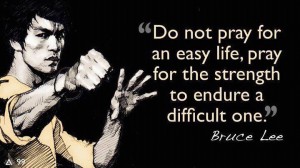 I am sitting here in my underwear sipping my first tea of the morning. My tree-house of an apartment is still dark, and I am playing Freecell.
I am sitting here in my underwear sipping my first tea of the morning. My tree-house of an apartment is still dark, and I am playing Freecell.
I use the principle, “How you do anything is how you do everything” very extensively… and I use Freecell, in this regard, as a modeling system.
I watch myself, I tweak my attitude, I tweak my methods, I watch myself like a hawk.
I watch my attitude, moment by moment. The “let’s get it over with”, the “it’s over… I give up”, the “Oh well, I am not that smart after all”, and watch that each of them take me out of the game.
I also watch my strategies, the move when I am willing to sacrifice the game for a quick gain in space, the move when I start picking the low hanging fruit without looking at the big picture.
And today I saw an attitude that made me put the game aside, and sit down and write this article.
The attitude of “being a good loser.”
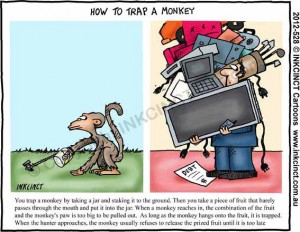 Let me talk about the opposite. Yesterday at my 4 pm call, I had a conversation with a client who has been around for a long time, and yet nothing much changed. Yesterday’s conversation made it crystal clear to me why: she is the kind of “player” who doesn’t like to give an inch. A sore loser.
Let me talk about the opposite. Yesterday at my 4 pm call, I had a conversation with a client who has been around for a long time, and yet nothing much changed. Yesterday’s conversation made it crystal clear to me why: she is the kind of “player” who doesn’t like to give an inch. A sore loser.
What does it mean, in coaching, that someone is a sore loser?
When you hire a coach, it is because you want to achieve something that you can’t achieve continuing doing the same thing you have been doing, the same way you have been doing.
Underneath what you do and how you do it, are hundreds of attitudes, a whole worldview.
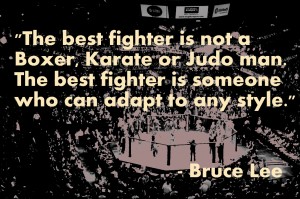 And of those, the most important, or at least one of the most important, is the willingness to let go of something. To let go of winning an argument, let go of being smart, let go of already knowing, let go of being right.
And of those, the most important, or at least one of the most important, is the willingness to let go of something. To let go of winning an argument, let go of being smart, let go of already knowing, let go of being right.
If you were right, you would already have what you want. If you don’t… then, well, maybe you are not as right as you think, and trying on a different way of thinking, a different way of approaching things, a different set of attitudes would be an intelligent move.
One of those changes may just take you to the Promised Land!
If you were just willing. But no, if you are a sore loser, you don’t trust yourself to recover, you don’t trust yourself to stay yourself if you follow anyone’s direction other than your already tried and barely working way.
You are tight, you are narrow, you are stiff, and you are stuck, like that monkey with the banana in its hand. 1
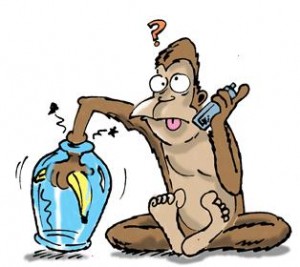 When you are a sore loser, like the monkey, you die with the banana in your hand… because you could not let go.
When you are a sore loser, like the monkey, you die with the banana in your hand… because you could not let go.
So, what is a good loser like?
A good loser is like a Bruce Lee… loose, agile, flowing, present, because they trust their own intelligence to recover from any momentary loss without much fuss, without losing the war.
A good loser doesn’t create a rigid plan, doesn’t have rigid standards of how things should go, a good loser knows where they want to go, and they know and practiced a thousand moves of winning and recovering, so they don’t mind taking detours if the “battle” takes them there: they know how to find their way again.
They are also not rigid about protecting their boundaries, protecting who or what they are… they don’t think they lose it.
Driving the car with your eyes on the hood
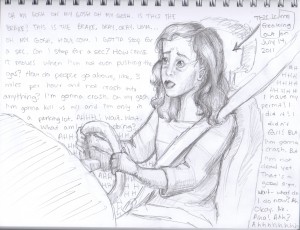 Using a driving a car analogy: A sore loser keeps their eyes on the hood: they are always afraid that it will pop open… they miss red lights, they miss their turns, they plow into the crossing people… their main concern is the darn hood.
Using a driving a car analogy: A sore loser keeps their eyes on the hood: they are always afraid that it will pop open… they miss red lights, they miss their turns, they plow into the crossing people… their main concern is the darn hood.
A good loser holds the steering wheels lightly, sits relaxed, and their eyes are not fixed on anything, their eyes hold the big picture, the sides, the mirrors, the distance, the people in the car. You can be sure that they will get to where they are heading, no matter how many detours, how many flat tires, how many emergencies they have, they stay relaxed, they solve the issue at hand and keep driving.
They have nothing to protect, they have a strong trust that their selves won’t disappear with every turn.
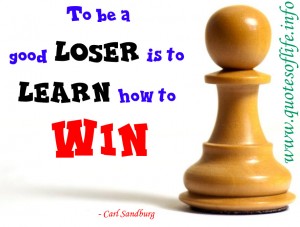 I do not know how to turn a sore loser client into a good loser client… I only know that the sore loser client is not fun to coach, and most likely won’t get much out of the coaching.
I do not know how to turn a sore loser client into a good loser client… I only know that the sore loser client is not fun to coach, and most likely won’t get much out of the coaching.
They will hear only what they can hear while their eyes are on the “hood”…
It’s my birthday today, and I have old clients sending me birthday wishes with ‘thank you’s from all over the place.
The thank you notes that arrest me are the ones that come from “sore loser” clients: I know I haven’t really made a difference, they haven’t changed.
Any suggestion on how to turn a rigid person into someone who can change?
- Native tribes used to catch monkeys by hollowing out a coconut and filling it with rice or other delicacies, then leaving it tethered to a tree for a monkey to find. A monkey would reach in and grab the desired delicacy and be trapped because the hole had been deliberately made just big enough for a flexible hand to enter but not for a closed fist to leave. In short order, the monkey went from getting his dinner to being someone else’s dinner.
Clearly it was not the coconut that was the trapping the monkey. Rather the true trap was in the monkey’s own mind, the monkey’s greed, the monkey’s attachment to his physical possessions, the monkey’s unwillingness to “Let Go.”
From that perspective, how are we trapping ourselves? Where are we creating our own boxes? Our own predicaments? Where would an outside perspective, one free of our emotional attachments, one unencumbered by our cultural norms, see a way out that we do not let ourselves see?
